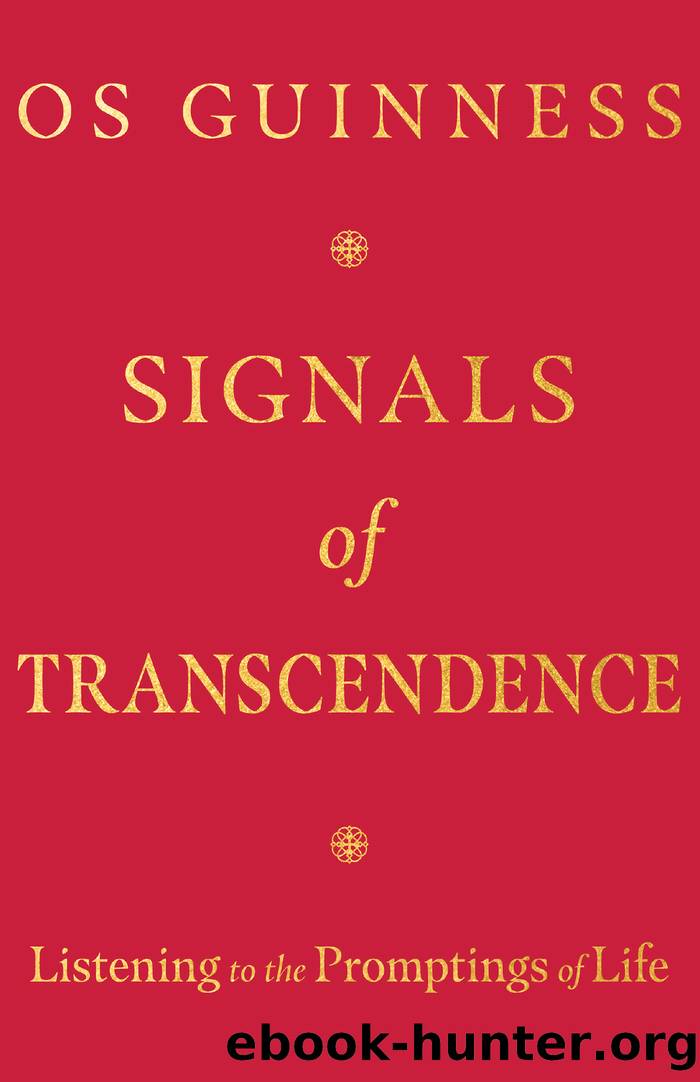Signals of Transcendence: Listening to the Promptings of Life by Os Guinness

Author:Os Guinness
Language: eng
Format: epub
Tags: Meaning of life;purpose in life;following gods leading in life;looking for the signs;cs lewis;leo Tolstoy;finding direction in life;disillusioned;searching for meaning;the great quest
Publisher: InterVarsity Press
Published: 2022-11-16T09:24:49+00:00
MORE TO LIFE THAN MEETS
THE MATERIALISTâS EYE
How did joy subvert Lewisâs atheism? Years before he met his wife, also named Joy, the idea of joy was so important to Lewis that he called it Joy, with a capital J. In his autobiography, Surprised by Joy, Lewis wrote of Joy that in a sense âthe central story of my life is about nothing else.â At its heart, his life was about longingââan inconsolable longingââfor something beyond human experience. Such longing was âan unsatisfied desire which is itself more desirable than any other satisfaction.â Joy, as he used the word, was sharply distinguished from both pleasure and happiness. Pleasure depends on the five sensesâthe sight of a beautiful landscape, the taste of a vintage wine, or the smell of an exquisite perfumeâand happiness is a matter of circumstances, faring well, and feeling well. Joy, however, transcends both pleasure and happiness. Nietzsche was right: joy wills eternity. Or as Lewis described it, âI doubt whether anyone who has ever tasted it would ever, if both were in his power, exchange it for all the pleasures in the world.â
Lewisâs idea of Joy included beauty, music, poetry, myth, human love, and nature. He tasted Joy as he walked the Mourne Mountains near his home in Northern Ireland, he heard it in the Ring Cycle of Richard Wagner, and he encountered it again and again as he read authors such as Spenser, Wordsworth, Coleridge, William Morris, and George MacDonald. One famous moment when Lewis tasted Joy occurred on a summer day when he stood beside a flowering currant bush. Suddenly and without warning the memory rose in him of a time in his old family home in Belfast when his older brother, Warnie, brought his toy garden into the nursery. He was overwhelmed by a sensation of blissful joy. âIt was a sensation, of course, of desire; but desire for what? Not, certainly, for a biscuit tin filled with moss, nor even (though that came into it) for my own pastâand before I knew what I desired, the desire itself was gone, the whole glimpse withdrawn, the world turned commonplace again, or only stirred by a longing for the longing that had just ceased. It had taken only a moment of time; and in a certain sense everything else that had ever happened to me was insignificant in comparison.â
Desire, longing, memory, sensation, a âwhiffâ of something, âhomesicknessâ for somewhere, âmysterious leaksâ of âSomething Elseâ into experience, a world beyond the border of the world, a âNameless IsleââLewisâs descriptions of being surprised by Joy are hauntingly evocative. But he always wanted to be precise. The promptings were not nostalgia, a yearning for the past. Nor did they stop and rest on any earthly object. They reach forward and higher and always out of reachââthey are only the scent of a flower we have not found, the echo of a tune we have not heard, news from a country we have never yet visited.â Joy was active, and not passive.
Download
This site does not store any files on its server. We only index and link to content provided by other sites. Please contact the content providers to delete copyright contents if any and email us, we'll remove relevant links or contents immediately.
The 5 Love Languages: The Secret to Love That Lasts by Gary Chapman(9792)
The Space Between by Michelle L. Teichman(6931)
Assassin’s Fate by Robin Hobb(6200)
Wiseguy by Nicholas Pileggi(5770)
Everything Happens for a Reason by Kate Bowler(4734)
Gerald's Game by Stephen King(4642)
Pillow Thoughts by Courtney Peppernell(4272)
A Simplified Life by Emily Ley(4158)
The Power of Positive Thinking by Norman Vincent Peale(4062)
Harry Potter and the Prisoner of Azkaban (Book 3) by J. K. Rowling(3355)
Resisting Happiness by Matthew Kelly(3337)
Girl, Wash Your Face by Rachel Hollis(3282)
Being Aware of Being Aware by Rupert Spira(3272)
The Secret Power of Speaking God's Word by Joyce Meyer(3184)
The Code Book by Simon Singh(3180)
More Language of Letting Go: 366 New Daily Meditations by Melody Beattie(3024)
Real Sex by Lauren F. Winner(3014)
Name Book, The: Over 10,000 Names--Their Meanings, Origins, and Spiritual Significance by Astoria Dorothy(2979)
The Holy Spirit by Billy Graham(2944)
